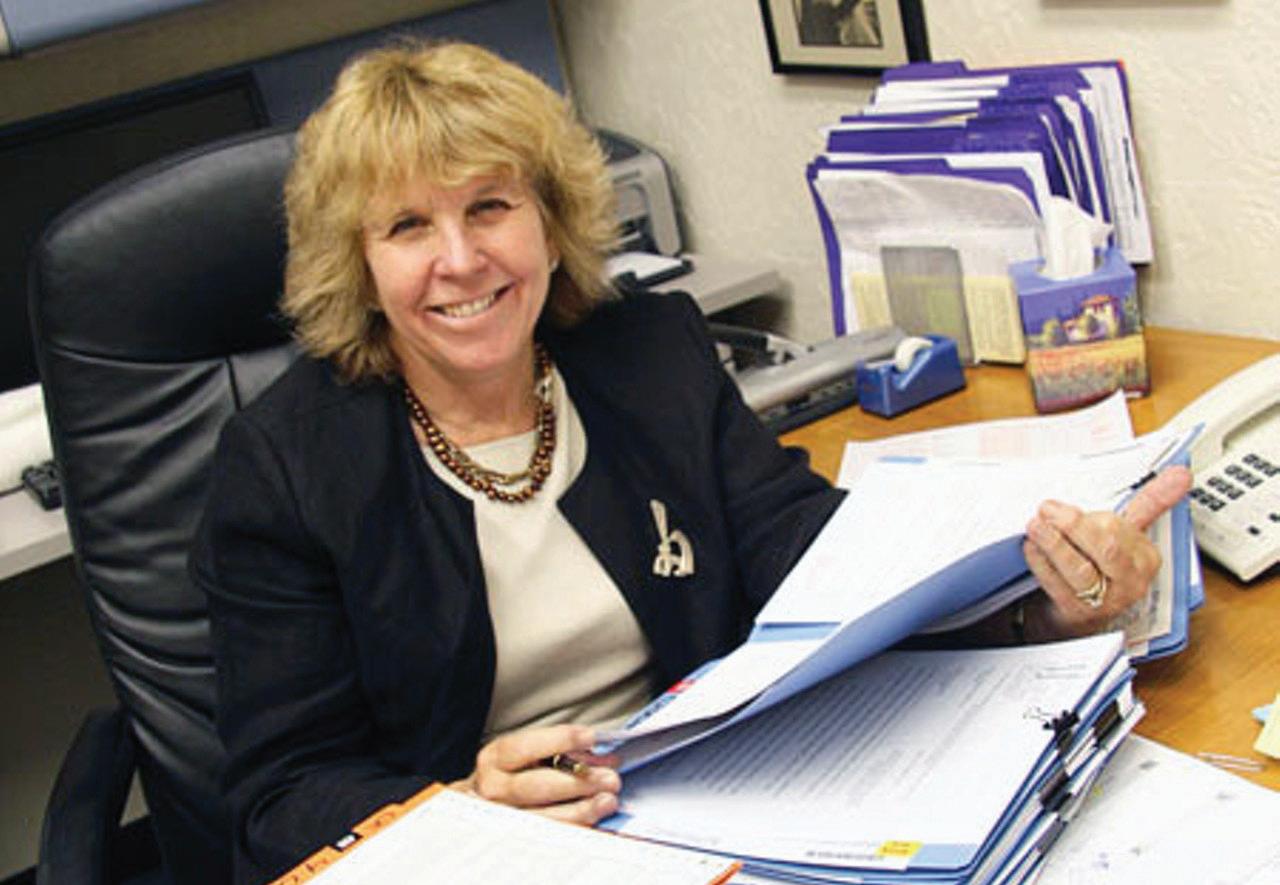
4 minute read
ACTIVELY SENIOR of justice
Anne Segal: Guided by a sense of justice By Mala Blomquist
Anne Segal grew up hearing stories of what it was like to be a judge from her mother, Lillian Fisher, who was elected to the Pima County Superior Court in 1974. Lillian stated in an interview before her death in 2015 that what meant the most to her in her career was establishing the Court Appointed Special Advocates program for neglected and abused children. Anne’s deep sense of justice led her to follow in her mother’s footsteps. “I went to law school, I worked in diferent capacities, had three children, and we were living in this little town of Las
Above: Judge Segal dons her robes. Left: Anne Segal at her desk.

Cruces, NM – not a big Jewish population,” jokes Anne. “We were there for 10 years, and there was an opportunity for me to run for ofce for the magistrate court. I ran, and I won.” She worked as a judge in New Mexico for four years before the family decided to return to Tucson in 2004 to be closer to both her husband, Dr. Robert Segal and her family. Tey were in Tucson a few years when Anne learned that one of the judges who was in her precinct was appointed to the position of justice of the peace because his mother-inlaw was on the board of supervisors. Anne felt that if you wanted that position, you should run for it and win it, not be appointed to it.
And that’s precisely what she did. In 2008, she ran, won the election and became Pima County Justice of the Peace in Precinct One.
“I think Jewish people have a heart that’s guided by a sense of justice. I mean, if something happens that’s unjust, we’re really incensed by it,” she says. “How do you get a sense of being a good judge? I think it’s by being a good Jewish citizen.”
Anne jokes that when people hear the term “justice of the peace,” they think she rides a horse to work. Te truth is that they hear the misdemeanors that occurred in the county. “So if a person is a drunk driving case, possession of small quantities of drugs, domestic violence, some trafc ofenses, theft and shoplifting, the justice of the peace will preside
over and resolve those types of cases,” says Anne.
Many times she had young people who were struggling with drug addiction who appeared before her having been arrested for possession of marijuana or being impaired in public. Still, she knew there were underlying causes for these problems. Tere was one case, in particular, she shared about a young mother who was 19 and found herself in front of Anne. Te fne for her ofense was $1,000, but Anne told her that she would waive it if the young woman got her GED (alternative to a high school diploma).
About 10 months later, the woman returned and Anne’s heart sank when she asked for proof of the GED, and she responded that she had not received it.
“I didn’t want to take $1,000 from this girl,” says Anne. “She looked at me and she said, ‘I went back to high school. I enrolled and I want to be like you. I realized I can’t get anywhere with the GED. I must have my diploma.’ ”
Continues Anne, “I couldn’t have been happier, and I knocked out the fne. Here’s this girl who actually put herself back in high school to get herself where she needed to be, and she is doing well. Tose are the kind of things you do as a justice of the peace when you are engaged. I loved it.” Anne was justice of the peace from 2008 to 2014, but when she ran again in 2018, she lost after a bitter election. From 2014 until recently, she had been teaching undergraduate courses in law-related topics at both the University of Arizona and Arizona State University when she was approached to write a textbook on law and mental health in the criminal justice system. In 2018, Wolters Kluwer published Mental Health and Criminal Justice. “I was able to formulate some good ideas for interventions,” says Anne. “Te book is designed for frst responders, social workers, and people wanting to go into those felds to give them a basic handbook and reference source for procedures and policies and structure of the criminal justice system as it afects the mentally ill.” Anne would like to do more writing and also get back to teaching; in the meantime, she keeps busy with volunteer work. She is on the board of directors for the Tucson Botanical Garden, on the Journalism Advisory Council at UArizona and works with the Assistance League’s Assisteens program that teaches kids in grades 7 to 12 about philanthropy.
She is also involved with the Jewish Federation of Southern Arizona and is a member of Congregation Bet Shalom.
“I’m just very proud of the Tucson Jewish community because it is so cohesive and they’ve been so good to me,” says Anne. “When I ran for ofce that was my base, and that community never abandoned me.”











